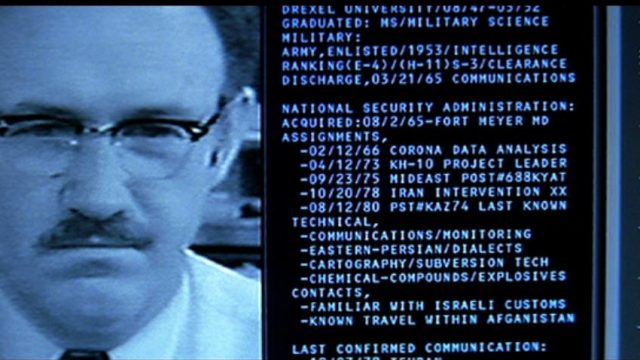Enemy of the State remains Tony Scott’s best film, a nearly perfect union of director and subject, where Scott’s compulsion towards multiple perspectives and styles conveyed an all-surveilling world, where the protagonist (Will Smith) doesn’t just have nowhere to hide, he has nowhere to even be unseen. It goes all in on the blockbuster tropes, never slows down and never gets too heavy, and stays thematically rich, in fact disturbingly accurate, over 20 years later. The exact compliment for it would be Spielbergian, and Spielberg paid homage to that when he made his own version of this, Minority Report, just a few years afterwards.
The thematic richness comes from the film itself, but gets deeper in the context of film history: it’s also a stealth sequel to The Conversation, not just by casting Gene Hackman as a surveillance expert out of the business, but by using some of the sets and one of the stills straight outta Coppola. Not just Hackman’s casting but his performance lets you know this could be Harry Caul: there’s the same core of solitude to the character”s.” Enemy‘s version of Harry has turned against his past (and given himself a cover name and background) and has found a life-giving anger instead of self-destructive paranoia; it’s a smarter and more moving way to play the 1998 version. A quarter-century can change a guy.
This isn’t just a matter of “I understood that reference,” although no reader here would deny themselves that pleasure. Both movies become richer and more interesting from the connection; the flowering of Conversation‘s surveillance culture into Enemy‘s empire of control is a matter of historical record, but on the level of character, too, Hackman’s victory at the end feels more earned with the weight of his earlier defeat before it–without the other, each is only half a story.
Intentionally and otherwise, art does this sometimes, not just as a matter of the Eternal Recurrence of the Forms but as little details that catch and fascinate us, an aspect of cinephilia that’s privilege as well as joy, the sort of thing that makes me suspect there really is some kind of universal creator, or at least editor, at work. I have other examples, of course: Full Metal Jacket as the origin story of Ronnie Gardocki, Blood Meridian‘s Judge living on as Anton Chigurh and then the Old Man (in The Road), my suspicion that Captain von Trapp just got so damn annoyed by all those goddamn noisy kids that he took off and changed his name to Hans Landa (got a promotion out of it, too); what are yours?
(This Taco Break courtesy of last week’s Solute Happy Hour, hosted by Ruck Cohlchez. Son of Griff has a pretty cool example of a large-scale version of this.)


